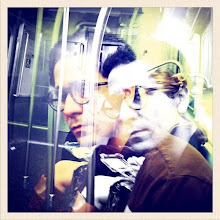Part I
Part II
Part III
In 1977 Werner Herzog, Edward Lachman and Jörg Schmidt-Reitwein traveled to the island of Guadaloupe upon hearing that a volcano there was about to explode and one peasant had refused to leave. They wander the deserted streets of the Basse-Terre and visit the smoking, sulfurous mouth of the volcano before finding three men awaiting their immolation at the foothills of La Grande Soufriere.
They wake the first man and address him in an oddly militaristic tone, "you have refused to leave the district, haven't you?"
He replies, as if to preclude all argumentation, by citing the combined, greater will of God and poverty. Herzog and his team, European huntsmen of history and passion, find that the poorest man has greater claim on the island than they do. The inverted sense of property and right to presence is resonant in the story that precedes this interview.
Herzog recounts a catastrophic volcanic blast in 1902 on the neighboring island of Martinique. 30,000 people died in an instant. The only survivor was a thief who was so incorrigible, constantly fighting the wardens and other prisoners, that he had been kept in an underground, solitary confinement cage. He had survived simply because he was the baddest guy in town.
Herzog's awe is compounded in his fascination with the impending, volcanic blast. The film team wanders the town waiting. They speak to the three men and hang on their words--listening like they watched the smoking mouth of the mountain. The peasants become the religious of voice of acceptance to wilderness and silence in spirit. The wandering, irresolute souls are Herzog, Lachman and Schmidt-Reitwein.
It is my standing suspicion that certain efforts of post-colonial paradigmatization are not meant to protect the colonized--who will continue living as they live, in their ecstasy or rage, wilderness or silence--but rather to protect the colonizers, who must post-colonially account for the reality of a greater, uncontrollable 'other' living in their midst.
Herzog speaks to the peasants in French but, rather than translate the dialog into English or German with subtitles, he dubs the dialog with his own voice, as if attempting to appropriate the sturdy words of the peasant for himself. But the language is not his own and when he speaks, we sense Herzog attempting to syncretize his purpose on the island with the presence of the peasant. Herzog is the indigene buffoon trying to mimic the words of his master.
One peasant asserts that they will all meet again in the bosom of God. Another says that he has stayed to, after he noticed that nobody else would, take care of the animals. The third asserts that 'the volcano is always above us.' Whether humanistic, animalistic, or geographic, each man, in his own manner, asserts a universality of presence. They take account for Herzog while Herzog struggles to take account of them.
Lawrence Buell, in his essay 'American Literary Emergence as a Postcolonial Phenomenon,' describes a problem that seems to arise in certain post-colonial situations, namely the expectation that artists be responsible agents for achieving national liberation, "which in turn bespeaks a specialized conception of art and an ambivalence toward aestheticism that threatens to produce schizophrenia." But it is precisely schizophrenia here that pressures eruption of greater power and awareness.
Herzog comes to the island to hear the words from the smoking mouth of passion. He finds that here, on the other side of his world, the smoking mouth colonizes him. What could he do to protect himself--to assert his presence--but stay on the island, and become one of them? Before a song which perhaps sang the mountain back to sleep (the volcano, in the end, never erupted), one peasant asks, "what have you got to lose?"
Parallels to all these thoughts can be found in another, more widely known, film, Lawrence of Arabia, and in the life and efforts of T.E. Lawrence in general.
Sunday, January 18, 2009
Subscribe to:
Post Comments (Atom)




No comments:
Post a Comment